Is your dog losing weight despite eating and eating?
Does your dog have soft, runny stools (poos)?
Your dog could have Exocrine Pancreatic Insufficiency (EPI).
What is EPI?
Exocrine Pancreatic Insufficiency (EPI) is the inability of the acinar cells of the exocrine pancreas to produce and secrete the 3 necessary enzymes needed to digest food. In easy terms the pancreas stops producing the enzymes needed to absorb the goodness from food. The three enzymes are:-
- Amylase for digestion of carbohydrates (sugars and starches in grains, fruits & vegetables).
- Lipases for digestion of fats and oils.
- Trypsin and Proteases for digestion of proteins.
EPI is sometimes referred to as Pancreatic Hypoplasia or Pancreatic Acinar Atrophy (PAA). EPI can also be the secondary condition of a chronic illness, such as chronic pancreatitis. Without these naturally produced enzymes, food remains undigested and unabsorbed resulting in an EPI dog, who despite eating copious amounts of food, is constantly hungry, undernourished and can literally starve to death. Without proper treatment, dogs with EPI can die a painful death from malnourishment, starvation and/or organ failure.
With EPI organ, immune, nervous and all other body systems become compromised to one degree or another. A lack of nutrients often results in temperament changes which may present themselves as fear and/or aggression. It is a devastating, frustrating disease that is all too often misdiagnosed. Symptoms usually do not appear until between 80% and 95% of the exocrine pancreas acinar cells are destroyed, what makes this disease even harder to diagnose. Not all dogs display any or all of the symptoms all of the time. Any breed can have EPI, not just German Shepherds.
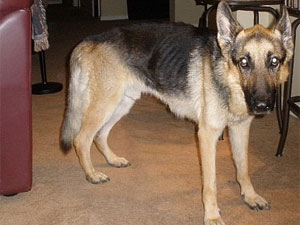 EPI dog before treatment |
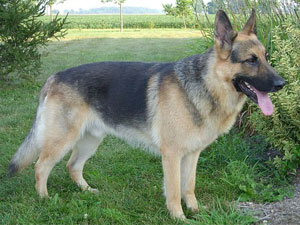 EPI dog carefully managed and stabilised |
What are the symptoms of EPI?
EPI can manifest anytime in a dog’s life, from a young pup to an elderly dog, with the severity and symptoms of the disease varying from dog to dog. The most common symptoms are:-
- Gradual wasting away despite a voracious appetite.
- Eliminating (pooing) much more frequently, sometimes every hour or two.
- Stools (poos) are greasy, voluminous, yellowish cow-pat, but sometimes greyish.
- Eating their own stools (poos), or other inappropriate substances.
- Increased rumbling sounds from the abdomen.
- Increased amounts of flatulence.
- Some experience intermittent watery diarrhoea or vomiting.
- Some dogs do not show any typical signs.
- Some display a personality change.
It should be noted that your dog may not have all of these symptoms, for example not all dogs will display a voracious appetite.
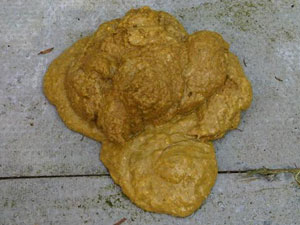 Typical EPI stool - yellowish cow-pat |
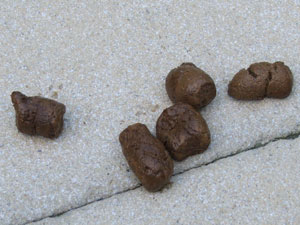 Stool of a stabilised EPI dog |
What is the test for EPI?
The only way to positively confirm EPI is with a TLI (Trypsin-Like Immunoreactivity) blood test, dogs should be fasted for 12 hours before this test. Normal range is between 5.7 - 45.2 µg/L, in dogs values below 2.5 µg/L are diagnostic for EPI.
Because GSDs and their crossbreeds make up 50% of positively diagnosed EPI cases, anytime a gastrointestinal upset persist with a GSD it is strongly advised that you have them tested for EPI.
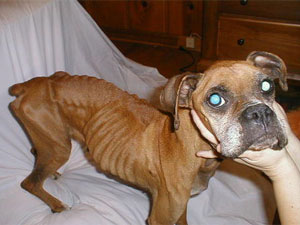 The devastating effects of EPI |
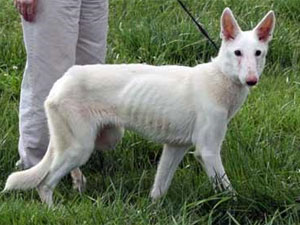 EPI dogs can starve to death if not treated |
What is the treatment for EPI?
We must stress here that every EPI dog is different and will require a different 'recipe' for stabilisation. It can take time to get everything in balance but is well worth the effort.
FOOD
Most, but not all, EPI dogs require a grain-free food. Home-cooked, raw food or a combination are also options. General guidelines are to avoid food with more than 4% fibre, some dogs need their fat content reduced, others should not be restricted. Finding the right food is trial and error, every dog is different.
ENZYMES
EPI dogs require enzyme replacements in EVERY meal. Lypex, Tryplase, Pancrex, Pancrex V or Pancrex V Forte are the most common replacements used in the UK. Raw fresh beef, pork or lamb pancreas can be used as a natural enzyme replacement.
SIBO
Small Intestinal Bacterial Overgrowth (SIBO) this is a secondary condition often found in dogs with EPI. Again simply put this is when the bad bacteria overtakes the good bacteria in the tissue lining of the small intestine. Treatment for this is a MINIMUM 30 day course of antibiotics such as Metronizadole, Oxytetracycline or Tylan (Tylan is more widely used in the US but can be obtained in the UK). Vets are often reluctant to prescribe a 30 day course of antibiotics but people who have stabilised an EPI dog know that anything less does not effectively eradicate SIBO, some EPI dogs will require a low dose of antibiotics for life, as without it SIBO will return time and time again.
COBALAMIN - VITAMIN B12
Low Cobalamin (Vitamin B12) levels are common in EPI dogs. Vitamin B12 levels should be checked and any low or low side of normal B12 deficiency should definitely be treated. EPI dogs benefit from having higher than normal B12 levels, so dogs with normal levels should also be considered for treatment.
The recommended treatment is with injections. Vitamin B12 injections should be given as follows:-
- One injection every week for 6 weeks.
- Followed by one injection after 30 days, and retesting 30 days after the last dose.
Recommended dosages of cobalamin for dogs.
| Dog's Weight | Dose of Cobalamin |
|---|---|
| Below 10 lbs | 250 µg |
| 10 lb - 20 lbs | 400 µg |
| 20 lb - 40 lb | 600 µg |
| 40 lb - 60 lb | 800 µg |
| 60 lb - 80 lb | 1000 µg |
| 80 lb - 100 lb | 1200 µg |
| above 100 lb | 1500 µg |
As Cobalamin is required for metabolism dogs with EPI may require B12 injections for life. The spacing of these injections will vary from dog to dog and will again be trial and error. It should be noted that B12 levels can drop very quickly causing an EPI dog to become unstable.
Full information can be found on the Texas A & M University website.
ALSO
Sometimes there is a Vitamin E deficiency and might need supplementation. Zinc supplements are also sometimes administered but only under a vet's guidance.
If there is bleeding check for rare but sometimes possible Vitamin K depletion.
Finding the balance - what to do once diagnosis has been confirmed.
No one wants their dog to have EPI but once you have a diagnosis at least you know what you are dealing with. So what should you do?
- Source a grain-free food and try that first. In the beginning you should feed your dog 150% of the recommended daily amount of food for a healthy dog. Feed your dog 3 or 4 smaller meals a day, EVERY meal must be treated with enzymes. Once your dog is stable it may be possible to reduce meals to 2 a day. Your dog will let you now when 150% food is too much, then you should start feeding the recommended daily amount for your dog's breed.
- NO TREATS. It's hard but at least until your dog is stable don't feed any treats. Once your dog is stable you can try little treats and see what effect they have. Some dogs will be able to tolerate small, natural treats on occasions.
- If your dog has rumbling abdominal noises, increased flatulence or both, then your should treat for SIBO with a minimum 30 day course of antibiotics. Some EPI dogs will require a low dose of antibiotics for life, as without it SIBO will return time and time again.
- If your dog is being treated with antibiotics it would be beneficial to add a probiotic to your dogs food. A probiotic replaces the good bacteria that antibiotics destroy. You should discuss this with your vet.
- Make sure your vet checks your dog's Cobalamin (Vitamin B12) levels, and treat with injections if necessary.
- KEEP A LOG OF EVERYTHING. The only way to manage EPI is to keep a log of everything. You should record what you are feeding, the amount of enzymes, dates of B12 injections, dates when things were changed, dates when new things were introduced, number of poos, texture of poos and so on. A log is invaluable for seeing patterns in your dog's treatment.
It's all about the poos!!!
If you have never dealt with EPI then this may sound a bit bonkers but anyone with an EPI dog will understand this statement completely. When you start treating an EPI dog your aim is to get the poos looking like that of any other healthy dog. Your dog can't talk, he can't tell you when you are getting things right and when you are getting them wrong, but you know that you have found a balance when the poos start looking the way they should!
It may take a bit of tweaking and a few tears along the way but with care and attention EPI dogs can live happy healthy lives. Even when you do find a balance it may only last a few weeks, a few months or even a few years then suddenly the poos go wrong again, that's when you know a little more tweaking is required.
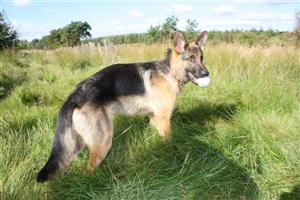 Wallace is a rescue dog with EPI |
 He is a happy, loving little lad |
Useful Links
| www.epi4dogs.com | An educational website and forum for EPI dogs and cats. |
| https://groups.yahoo.com/neo/groups/k9-EPIGLOBAL/info | A self-help group where owners and caregivers of vet-diagnosed EPI dogs can exchange ideas and share personal experiences. |
| www.chemeyes.co.uk | A family run company based in Surrey, manufacturing pancreatic enzyme products for the treatment of EPI. They also own an EPI dog so understand the needs of owners. |
| www.rawtogo.co.uk | Raw To Go are suppliers of raw meat and bones, all produce is DEFRA approved and delivery is nationwide. All meat comes frozen and bagged in easy to store packs. Raw To Go also sell raw pig pancreas for EPI dogs, it is not listed on their website, please contact Lesley for more information. |
| www.prizechoice.co.uk | Prize Choice offers dog owners the choice to use a real meat product to prepare home made foods with the knowledge that the ingredients are free from chemicals, additives, preservatives and colourings. |
| www.vetuk.co.uk | Online store selling vet supplies at reduced retail prices and often with free delivery. |
| www.nutrixpetfoods.co.uk | If you are looking for an EPI dog food please take a look at Nutrix Pet Foods Duck and Potato completely grain-free food, suitable for dogs with Excorine Pancreatic Insufficiency (EPI). |
| www.thenookpetlitter.co.uk | Ashenbank Adult Lamb Casserole grain-free food. Suitable for dogs with Excorine Pancreatic Insufficiency (EPI). |
